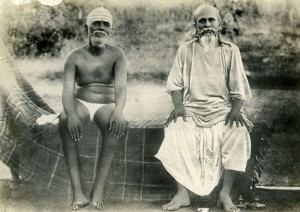
This was originally posted on my blog on 6th May, 2008.
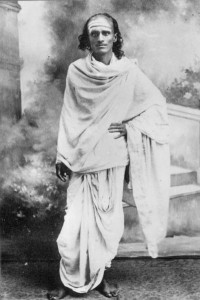
Many devotees are aware that Ganapati Muni was granted the title ‘Kavyakantha’ (‘One who has poetry in his throat’) by a learned assembly of Sanskrit pandits, but not many people know how he earned this distinction, or how much literary skill he had to display to earn it.
At the turn of the twentieth century, Nawadweepa, an ancient and famous seat of Sanskrit learning, regularly interviewed pandits and scholars from all over the country. Every year they all came there to display their knowledge of the Sanskrit language, and all the works that had been composed in it. Those who impressed the examiners were granted prestigious titles that were recognised all over India as being a high and well-earned accolade in Sanskrit scholarship.
The examination was an oral one, and the ‘syllabus’ was just about everything that had ever been written in Sanskrit. Candidates would have no idea in advance whether they would be asked to expound on astrology treatises, puranic stories, poetic dramas or philosophy. In addition to having an encyclopedic knowledge of the literature, applicants had to formulate their answers in Sanskrit verses that rhymed and scanned. Mistakes in prosody counted against you just as much as an ignorance of the topics being discussed. If the examiners wished to ask supplementary questions, they too had to formulate their questions in Sanskrit verse. If both sides were equal to the challenge, the result would be a fierce intellectual combat. Spontaneously composed verses would be hurled backwards and forwards, and the tiniest mistake would be pounced on and held up to ridicule. When this happened, the ‘ridicule’ would also be couched in Sanskrit verse.
When Ganapati Muni went to Nawadweepa in 1900 to have his Sanskrit knowledge tested, he was still a teenager. His life-defining meeting with Bhagavan was still in the future. In those days he was simply a brilliant young scholar, trying to make his way in the scholarly world. That year, hundreds of pandits and students went to Nawadweepa, all hoping to get some recognition of their talents. This necessitated preliminary interviews which only those who exhibited sufficient competence graduated from.
Since Ganapati Muni came highly recommended, a well-known scholar, Sitikanta, decided he would introduce Ganapati Muni to the chief examiner, Ambika Datta, in advance.
As they approached the seat where Ambika Datta was sitting, Ganapati Muni asked, ‘Who is this exalted person?’
Sitikanta was a little embarrassed that Ganapati Muni had asked this question at a volume that was loud enough for Ambika Datta to hear. He thought that displaying an ignorance of the identity of the chief examiner, who was a famous scholar, might count against Ganapati Muni.
Ambika Datta was not perturbed. He simply smiled and introduced himself by composing half a verse that identified himself:
I am a Gouda [from a region in Bengal], an adept in extempore poetry, and my name is Ambika Datta.
When Ganapati Muni heard this, he immediately recognised that this was the first salvo in a poetic war. He knew that he was now expected to complete the verse by adding two more lines that would include his own identity and qualifications.
Immediately he replied, in the same metre:
I am Ganapati from the south, the chief of the clan of poets, highly accomplished.
Then, in a barbed comment aimed at Ambika Datta, he added in Sanskrit, ‘You are only an adopted son, whereas I am a true son’. ‘Datta’ in Sanskrit means adopted son, whereas Ganapati is the true son of Ambika, which is one of the many names of Parvati, Siva’s consort. Those who were listening broke out into spontaneous applause. This was just the sort of snide comment – literary, allusive and couched in perfect Sanskrit – that made the competition so much for fun for all the serious applicants.
Having displayed an ability to compose spontaneous poetry in Sanskrit, along with the equally valued ability to fire off spontaneous literary insults, Ganapati Muni was allowed to dispense with the preliminary interview and proceed to the main examination. Ambika Datta took him to the place where the exam was to take place and gave him his first four topics. The competition began with what are called samasyas: the first part of a stanza that alludes to some topic or story in Sanskrit literature. The candidate had to identify the subject that was being hinted at and then complete the verse in a way which demonstrated he was aware of the subject matter that was being alluded to. These introductory lines were far from straightforward. Occasionally they resembled clues from a cryptic crossword, rather than easy-to-identify literary or scriptural allusions.
Ganapati Muni’s four samasyas were:
- The daughter-in-law, removing the cloth covering her breast, longs for her father-in-law, yet she is of spotless character.
- Once in a year Gauri does not look at the face of her husband.
- Sun, along with moon, lost, but not a new-moon day.
- Ant kisses the orb of the moon.
Ganapati Muni resolved the first one by completing the verse with a story about Hidimba, the wife of Bheema, who was the son of Vayu, the wind god. She removed her cloth because she desired her father-in-law, in this case Vayu, a cool breeze.
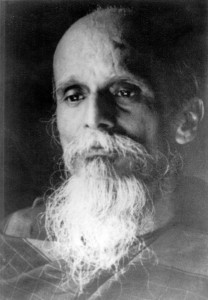
Ambika Datta, in response, said that when he had formulated the lines he was thinking of the story of Draupadi and Bheema, not Hidimba. Challenging the appropriateness of this, Ganapati Muni reminded him that Draupadi had had five husbands, not just one, which meant that she would have had five fathers-in-law as well. He also mentioned that Draupadi, coming from a royal lineage, would not be stripping in the forest like an ordinary rustic. He repeated his assertion that his resolution of the riddle was more appropriate.
The second samasya alludes to a tradition that nobody should see the moon on the Ganesh Chathurti day. If they do, they will get a bad name and be the victim of false allegations. Ganapati Muni completed the verse in the following way:
On the fourth day of the bright fortnight of the month of Bhaadrapada [Ganesh Chaturthi day], fearing that she might see the moon, Parvati [Gauri] does not look at the face of her husband [Siva].
Siva has the moon in his hair, so Gauri avoids looking at his face on that particular day.
The third samasya was a terse summary of an unfavourable astrological configuration. Ganapati Muni expanded on it in the following way:
In the horoscope of a child, if Rahu is at an angle, Guru in the third house and Kuja in the seventh house, and if Sun and Moon are placed in the Lagna, the child will not survive.
Ganapati Muni completed the fourth samasya by narrating an event that took place after Daksha’s sacrifice:
Sati Devi immolated herself in the sacrifice performed by Daksha, her father. As Siva, stricken with grief, lay on the Himalaya mountain, the moon on his head touched the ground, allowing the ants to lick it for the nectar it contained.
These were very obscure references, but Ganapati Muni rose to the challenge by composing verses that demonstrated he had understood the implication of all of them. He even managed to tell Ambika Datta that his, Ganapati Muni’s, resolution of one samasya was superior to the one that the examiner had envisaged.
With this initial test successfully completed, Ambika Datta moved on to the topic of literary criticism. Ganapati Muni was asked to comment on two slokas, one from Raghuvamsa and one from Kavyaprakasa.
Ganapati Muni expounded on the literary peculiarities of the first sloka, without attracting any comments from Ambika Datta, but when he moved on to the second, he made his first mistake in Sanskrit prosody: he said sarvesaam, with a long ‘a’, instead of sarvesam, with a short ‘a’. He immediately stopped and corrected himself, but this was the error that Ambika Data had been waiting for. He cut him short and hurled a four-line Sanskrit insult at him:
Though your poetry is flawless, and your prose as well is captivating, how is it that your speech falters? Have you not adored Tara, who is the very essence of the three worlds?
Tara is a tantric goddess who embodies the divine energy that sustains the world. This would have been a particularly hurtful insult for Ganapati Muni since he was a sakta, a worshipper of female divine energy. Ambika Datta was accusing him of making mistakes because he lacked proper devotion to his chosen deity. Unfortunately, in his haste to formulate the insult, Ambika Datta had also made a grammatical error. He had said ‘sara Tara’ instead of ‘sarastara’.
Stung by this assault on his beliefs, but given an opportunity to fight back, Ganapati Muni ratcheted up the abuse with the following verse:
Poetry that laughs at nectar, which belittles the taste of honey and steals the fame of the lip of the beloved does not adorn your mouth. Have you not come to worship the one who halves his body with the beloved?
This was a rather elegant way of pointing of Ambika Datta’s incorrect usage. Instead of using the masculine form saarah, Ambika Datta had said ‘saaraa’, the feminine form of the noun instead. Ganapati Muni was saying, ‘In your preoccupation with the feminine goddess Tara, have you not forgotten the male (Siva) who shares his body with her?’
Ambika Datta, a senior and respected figure in the Sanskrit world, began to get angry. He was not accustomed to having his mistakes pointed out by teenagers. He shouted out, in Sanskrit:
O elephant, do not make so much noise in rut. Now, the lion that makes a meal of the elephant brains, sleeps.
The noisy, rutting elephant is Ganapati Muni, loudly complaining about Ambika Datta’s errors. Ambika Datta is warning him that there will be a limit for such abuse. Comparing himself to the lion that can kill the elephant, he says, in effect, ‘Be careful, I am sleeping now, but at any moment I may wake up, kill you and eat your brain!’
Unperturbed, and with no intention of backing down, Ganapati Muni pointed out yet another poetic error that Ambika Datta had made in his latest insult. After explaining, in verse, where he had gone wrong in his alliteration and his rhyming, Ganapati Muni, twisted the knife a little more:
O crow! If you are seated on a mango tree, pray remain silent. Let the world honour you by taking you to be a cuckoo.
Meaning, of course, ‘You can sit there with your mouth closed and people will think that you are capable of making sweet and wonderful sounds, but as soon as you open it, only harsh and unpoetic noises come out!’
The two continued to trade versified insults:
Ambika Datta: ‘O firefly, does it not occur to you that you can be seen only in darkness?’
Ganapati Muni: ‘Ah, you lamp, you shine all right in the house, but outside you are wafted hither and thither.’
I would guess that Ganapati Muni meant by this that Ambika Datta could shine in the limited circle of his acquaintances, but when he was subjected to outside testing, he could not retain his equanimity or his grasp of Sanskrit prosody.
These insults might have continued indefinitely, but at this point Sitikanta, the man who had introduced Ganapati Muni to Ambika Datta, intervened and said that they should end their fight in a literary way: they should each compose one verse that insulted the community to which the other belonged, after which the debate would be declared over. The two participants agreed and Ambika Datta went first:
All Bhattas [South Indian brahmins] go to the terrace of their houses, drink wine, and then start sporting with the courtesans.
Ganapati Muni responded with:
These fellows, the Goudas, would not give up their craving for fish, even if it cost them their life or their wealth.
Some Bengali communities ate fish, even though they were supposedly vegetarian. They excused this on the rather specious grounds that fish were ‘sea vegetables’, rather than animals. This is a reference to this habit.
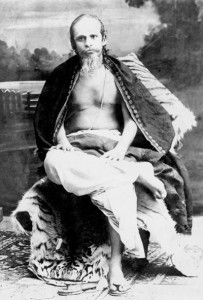
Ambika Datta loved this final verse, even though it was an insult directed at his community, because of a clever combination of sounds in one of the lines. The word for fish is ‘mina’ and Ganapati Muni had constructed a line, part of which said ‘ami na mina’, a clever pun that sounded like a pair of fish. With the battle over, Ambika Datta embraced Ganapati Muni and congratulated him on his charming and high-class poetry. Ganapati Muni apologised for letting it get so personal, but Ambika Datta said that the pair of fish in the final verse made up for all the previous insults.
A decision to award Ganapati Muni the title of ‘Kavyakantha’ was taken unanimously by the committee that ran the event. The citation on Ganapati Muni’s diploma read as follows:
Poetry, though not one of the gems born of churning the Ocean of Milk, is the elite nectar of the human family. He who acquires this accomplishment by extreme good luck and palpable divine grace should, though he is of the earth, be looked upon and honoured as a divine being by savants who relish real greatness.
As you have now, by your extraordinary poetic talents, pleased this august company of savants, we the citizens of Nawadweepa have a sense of fulfillment by your presence and performance. Srimat Ganapati Sastri of Kaluvarayi village in the Visakhapatnam area! We hereby honour your excellent traits with this sloka, and also give you our blessings:
‘May the fame acquired by the best of ancient poets, Kalidas and others, follow you now. May you shine forth with splendour, adorned by the charming title “Kavyakantha” conferred on you by discerning scholars of distinction.’
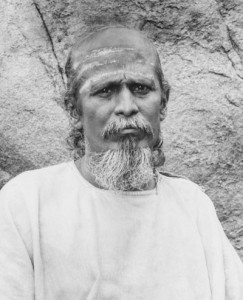
If any readers have got this far without giving up, I suspect that quite a few will be thinking, ‘Why is he wasting his time on stuff like this?’ All I can say in response is that I am in absolute awe of people who can accumulate a comprehensive knowledge of thousands of years of Sanskrit literature and then debate facets of that knowledge in flawless Sanskrit verses, composed extemporaneously. And remember, this is a ‘dead’ language, not one that is spoken. It is learned as a second or third language by those who participate in such events. The only remotely comparable parallel I can think of in western literature is a club founded by Tolkien, the author of The Lord of the Rings, in Oxford. Tolkien was an English professor who specialised in Anglo-Saxon literature. He formed a club, called ‘The Coal Biters’, which met periodically to compose spontaneous Anglo-Saxon verses in each other’s company. I don’t know how good they were, but I somehow doubt that they would have been able to debate the intricacies of Beowulf in spontaneously composed verses at the speed that these Sanskrit pandits did.